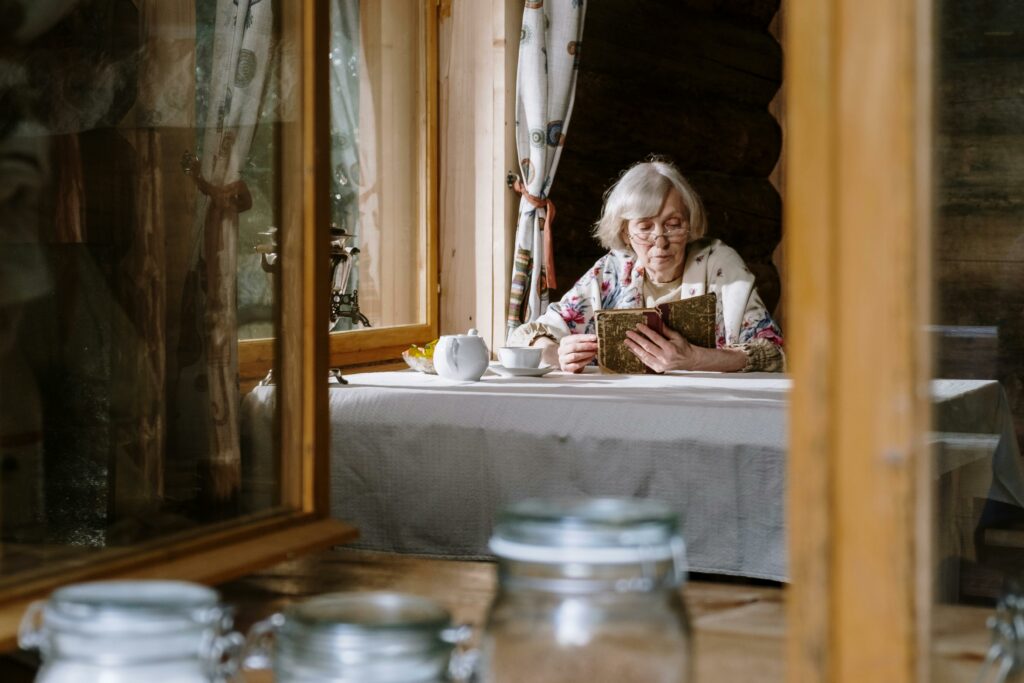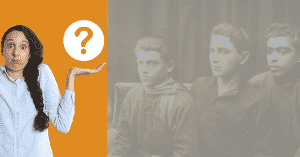The intellectual advantages of delving into the pages of historical books are numerous, particularly for senior readers.
It nurtures cognitive abilities, keeps the mind active, and stimulates memory recall, all while providing a pleasurable and entertaining escape.
Moreover, historical books can serve as a catalyst for intergenerational conversation, bridging the gap between the young and the old through shared interest in the human story.
Embarking on these literary journeys allows senior readers to not only revisit the days of their youth but also to compare and contrast with the past, fostering a greater appreciation for the present.
For those poised to explore the rich tapestry of history through literature, it becomes more than just reading; it’s an exploration of life’s continuum.
Selecting the right historical book can be the first step to unlocking a treasure trove of knowledge and enjoyment.
Whether it’s finding kinship in a character from a bygone era or understanding the origins of current societal dynamics, these books hold the power to enlighten and engage in ways that other forms of media simply cannot match.
Benefits of Historical Books: Key Takeaways
- Historical books can enrich senior readers’ intellect and provide a deeper understanding of history.
- These narratives invite cognitive engagement and stimulate memory in an entertaining format.
- Choosing the right historical books can provide cultural insights and foster intergenerational conversation.
The Significance of Historical Books

Historical books serve as bridges, linking readers to the epochs and events that have shaped humanity.
They are the canvas where the colors of past societies come alive, allowing a profound comprehension of history and its complex tapestry.
Fostering a Connection to the Past
Can you imagine walking the streets of ancient Rome or sailing the uncharted seas with explorers of yesteryear?
History books invite readers to do just that. They stir the imagination, allowing one to live vicariously through the experiences of others from bygone eras.
This connection to the past enriches one’s understanding of the human journey and fosters an appreciation for the foundation upon which modern society stands.
Revealing Societal Contexts Over Time
What did it mean to be a knight during medieval times or a factory worker during the industrial revolution?
Through the looking glass of historical literature, we gain insights into societal norms and values that prevailed.
History books peel back the layers of time to reveal the thought patterns and social frameworks that influenced human interactions and decisions.
Understanding Historical Events
Lastly, when it comes to historical events, isn’t it curious how the same story can be told so many ways?
History books play an instrumental role in chronicling these events with diverse perspectives, allowing people to piece together a more holistic view.
This array of viewpoints helps readers comprehend not just the events themselves, but also their nuanced implications for our present and future.
Intellectual Advantages for Senior Readers

Senior readers often discover that diving into historical books isn’t just a journey through time—it’s a thorough workout for the mind!
Enhancing Critical Thinking Skills
When you pick up a historical book, you’re not just reading—you’re honing your critical thinking skills.
Ever found yourself questioning characters’ motivations and the truth behind the events?
That’s because historical narratives encourage you to weigh evidence, analyze situations, and make judgments.
In fact, reading literary fiction is linked to better understanding the motivations of others, which is a core component of critical thinking.
Building Knowledge Through Literary Exploration
Every book you read is an expansion of your personal wisdom—think of it like adding more books to your mental library.
Literary explorations, especially within history, are gateways to knowledge.
They transport you across centuries and civilizations, turning each page into a lesson.
You don’t just learn about historical events, you learn from them.
The intricate tapestry of human experiences in these books can lead to profound intellectual enrichment for eager minds.
Experiencing Diverse Perspectives
Imagine you’re sitting in a room with people from all over the world, each sharing their unique story.
Historical books offer you this multitude of voices, each from a different time and place.
Reading these books introduces you to perspectives that may differ greatly from your own, ultimately fostering a deeper sense of empathy.
As you navigate through the diverse landscapes of human history, you’re not merely observing—you’re experiencing the world through the eyes of individuals from the past.
Historical Books and Intellectual Enrichment
Engaging with historical literature opens doors to intellectual enrichment, offering a rich tapestry for understanding complex histories and contemporary situations.
Literature as a Gateway to Learning
Historical books act as time machines, allowing one to explore the past in a way that can be both enlightening and entertaining.
Through the power of narrative, they provide personal insights into events that shaped the world.
A reader becomes a detective, piecing together clues from past narratives to develop a nuanced understanding of history.
This process not only imparts knowledge but also sharpens one’s analytical skills, leading to greater intellectual enrichment.
Understanding the Present Through the Past
One gains profound insights into why the world is the way it is by reflecting on historical events through literature.
It’s like having a conversation with the past to decode the present.
Have you ever wondered why certain societal norms exist? Or why historical events seem to echo into modern times?
Historical books provide context, aiding one’s capacity to understand the present and recognize patterns in human behavior over time.
Writing about these connections can also reinforce one’s comprehension and bring clarity to complex ideas.
Developing a Deeper Understanding of History

When one cracks open the spine of a historical book, they embark on a journey that does more than just tell a story; they unfurl the fabric of time, revealing how the past weaves into the present.
The pages breathe life into bygone eras and beckon readers to dissect and connect eras with a fresh perspective.
Analyzing the Nuances of Historical Context
Imagine thumbing through a dusty volume and stumbling upon an old letter. What secrets does it hold?
To truly understand history, one must parse through the lines and between them.
Readers gauge the pulse of the period, while deciphering the language, motives, and unspoken rules that shaped society.
They might find themselves asking, “What drove these people? What can their fears and dreams tell us?”
Connecting Past and Present
Let’s jog down memory lane—how did our world evolve from past civilizations to our modern society?
Delving into historical books allows readers to trace this continuum.
As if by magic, the events that once seemed distant flicker to life, suddenly relevant.
“How does this echo in today’s world?” they ponder, bridging centuries with parallels that illuminate the roots of our culture and current events.
Appreciating the Evolution of Societies
Have you ever marveled at a city’s architecture and wondered about the stories behind each brick?
The evolution of societies is a tapestry rich with change and consistency, triumph, and turmoil.
With each turn of the page, readers grow to appreciate the myriad forces that continually mold our culture and society.
They peer into the crucible of history, witnessing the alchemy of human progress.
Cultural and Societal Insights from Historical Books

Dive into historical books and observe how they illuminate the intricacies of culture and society.
They’re like time machines, offering glimpses into bygone eras, helping preserve the essence of who we were and shaping who we are.
Preserving Identity and Tradition
Historical books are keepers of the past, meticulously documenting the identities and traditions that define various cultures.
They ensure that the colorful tapestries of different societies are not lost to time.
When one engages with the stories of ancestors, it’s like using a photo restoration service to bring faded cultural memories back to full glory, keeping the heritage vibrantly alive for future generations.
Reflecting on Morals and Values
Peering into the past reveals the evolution of society’s morals and values.
From the valor in ancient epics to the calls for justice in antebellum narratives, historical literature provides a mirror reflecting the ethical beliefs that have guided civilizations.
It’s fascinating to trace how the moral compasses are similar—or starkly different—from those we hold today.
Understanding Changes in Societal Norms
What was taboo? What was celebrated?
Historical books chronicle the transformations of societal norms, providing context to today’s discourse and debates.
They pry open the dialogues of the past, revealing the stepping stones of social evolution, and foster a deeper understanding of the shifts that continuously mold contemporary citizenship.
Entertainment Value in Historical Books
Historical books aren’t just about dusty archives and dates; they’re a treasure trove of escapism.
With characters that come alive off the page and settings that whisk you to another era, the entertainment value is immense.
Let’s unpack what makes this genre so enrapturing.
Engaging with Compelling Characters and Plots
Imagine befriending people who lived centuries ago or walking in the shoes of a queen plotting to secure her throne.
Historical novels give us this chance—characters with intricate lives, substantial conflicts, and personal triumphs.
It’s about diving headfirst into a storyline where you’re rooting for characters as if they were old friends, or perhaps your own ancestors.
Think of it: rivalries that shape kingdoms, or the simple, heartfelt journey of a commoner.
Doesn’t that sound more intriguing than another rerun of your favorite TV show?
Exploring Different Time Periods and Settings
Ever had the itch to time travel?
Flick through the pages of a historical book, and you’re instantly transported to the rugged landscapes of ancient Rome or the opulent halls of Victorian England.
These settings are not just backdrops; they’re immersive experiences crafted with meticulous detail.
It allows one to saunter through histories and societies vastly different from our own, understanding the sense of place that you can almost touch, smell, and feel enveloping you.
And isn’t it fun to explore these unique places without leaving your favorite reading nook?
Engaging Senior Readers with History
History isn’t just a collection of dates and events; it’s a rich tapestry of stories that can spark the imagination and provoke curiosity, especially for senior readers.
Bringing the Past to Life
Imagine the smell of ancient libraries, the rustle of parchment, and the whispers of bygone eras—reading historical books does just that.
Senior readers, often rich in experiences themselves, find a special kind of joy in unearthing life stories that echo through the ages.
It’s more than just reading; it’s time traveling from the comfort of a favorite armchair.
With each page turn, traditions come alive, and history transforms from abstract facts into palpable, lived experiences.
Encouraging Lifelong Learning and Curiosity
Who said learning stops as you age? Certainly not those immersed in their silver years.
Regular reading keeps the mind sharp, and what better way to exercise your brain than by exploring different historical periods?
Senior readers demonstrate that curiosity knows no age limit.
By engaging with history, not just as observers but as active learners, they continuously expand their horizons and understanding — fostering a spirit of lifelong learning, critical thinking, and a deeper appreciation of the people and societies that shaped the world.
Practical Tips for Selecting and Reading Historical Books

Before diving into historical adventures, it’s crucial to have the right strategies in place.
This guide ensures you choose historical books wisely and forge an enriching reading experience, tailored to your interests and facilitated by the best resources available.
Identifying Reliable Historical Sources
When searching for credible history books, start by checking the author’s credentials and publisher’s reputation.
Examine the bibliography for extensive research and peer reviews.
Look for books commended by academics or history enthusiasts – their approval often signifies trustworthy material.
Libraries and online databases like MemoryCherish provide reviews and recommendations that guide you in sorting the wheat from the chaff.
Tailoring Reading Choices to Personal Interests
What era captivates you? Is it the grand narratives of ancient empires or the intimate diaries of war?
Aligning your selections with your passions can make learning history a more engaging affair.
Mixing genres can keep things fresh too.
Why not add historical fiction to the mix for a flavor of eras gone by?
Entwining fact with fiction, as mentioned on Andylazris, might just spice up your reading routine.
Making Use of Technology and Resources
Embrace the digital age.
E-books and audiobooks offer a convenient way to absorb history, while websites and apps can enhance your understanding with interactive timelines and maps.
Many historical societies also provide digital archives for your archival research endeavors.
Stay in touch with the times to make the past a part of your everyday life.
Frequently Asked Questions
When it comes to diving into the depths of history through literature, there’s a treasure trove of wisdom awaiting senior readers. Let’s explore how historical books provide not just a portal to the past but a brain-boosting workout and a clarity to current events.
What are the cognitive benefits of reading historical books for seniors?
Reading historical books offers seniors a workout for the brain that can sharpen memory and improve cognitive function. Think of it as your mental gym, where every page-turn helps strengthen those brain muscles.
How does reading classic literature contribute to intellectual enrichment?
Classic literature is the food that nourishes the mind, providing a rich source of complex ideas and timeless wisdom. It challenges you to think critically and encourages a deep dive into different cultures and philosophies.
Can reading historical fiction enhance one’s comprehension of historical events?
Absolutely!
Historical fiction breathes life into the dates and facts, making you feel like you’re right there alongside historical figures.
It’s like having a front-row seat to the history you thought you knew.
Why is it important for individuals to include history books in their reading habits?
Incorporating history books into your reading diet allows you to connect dots throughout time, offering insights into how past events and cultural shifts shape the world we live in today.
How does reading about history improve our understanding of current events?
History books act as a lens, bringing into focus the origins of current affairs.
They reveal patterns and offer perspectives that can illuminate the path forward.
What role do historical books play in fostering lifelong learning and curiosity?
Historical books are curiosity’s best friends, provoking questions and opening doors to new worlds.
They ensure that learning doesn’t stop after formal education but continues throughout life.






